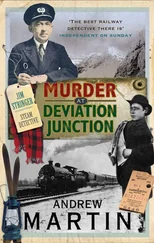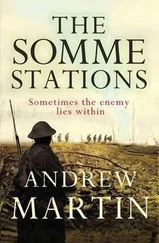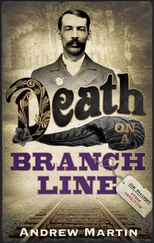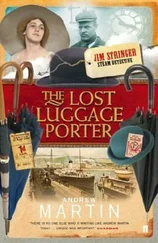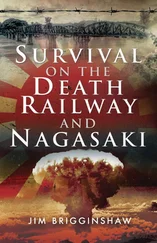Andrew Martin - The Necropolis Railway
Здесь есть возможность читать онлайн «Andrew Martin - The Necropolis Railway» весь текст электронной книги совершенно бесплатно (целиком полную версию без сокращений). В некоторых случаях можно слушать аудио, скачать через торрент в формате fb2 и присутствует краткое содержание. Жанр: Детективная фантастика, на английском языке. Описание произведения, (предисловие) а так же отзывы посетителей доступны на портале библиотеки ЛибКат.
- Название:The Necropolis Railway
- Автор:
- Жанр:
- Год:неизвестен
- ISBN:нет данных
- Рейтинг книги:5 / 5. Голосов: 1
-
Избранное:Добавить в избранное
- Отзывы:
-
Ваша оценка:
- 100
- 1
- 2
- 3
- 4
- 5
The Necropolis Railway: краткое содержание, описание и аннотация
Предлагаем к чтению аннотацию, описание, краткое содержание или предисловие (зависит от того, что написал сам автор книги «The Necropolis Railway»). Если вы не нашли необходимую информацию о книге — напишите в комментариях, мы постараемся отыскать её.
The Necropolis Railway — читать онлайн бесплатно полную книгу (весь текст) целиком
Ниже представлен текст книги, разбитый по страницам. Система сохранения места последней прочитанной страницы, позволяет с удобством читать онлайн бесплатно книгу «The Necropolis Railway», без необходимости каждый раз заново искать на чём Вы остановились. Поставьте закладку, и сможете в любой момент перейти на страницу, на которой закончили чтение.
Интервал:
Закладка:
My landlady stood up and sighed. She told me to take my whistle outside and blow it again. I did so, getting some very queer looks, and when I returned there was a blanket over Stanley and my landlady's straw hat was back on her head.
From the grate, where it had drifted, I picked up an article headed: 'DIVORCE DIVISION', before Mr Justice Barnes and a special jury, 'EX-BARRISTER-AT-LAW A RESPONDENT'. It continued, 'Mrs Anne Stanley (nee Hedley) sought a divorce by reason of the alleged cruelty of her husband, Mr Adrian William Stanley, an ex-barrister-at-law, formerly of The Maples, Guildford, Surrey.'
There was a banging at the door, which I had left open; the constables had arrived, so I read on rapidly: Mr Clark, appearing for the respondent, said it was a shocking case… He asked Mrs Hedley: 'When did the cruelty begin?' and she replied 'With his anxieties at his chambers. He threw a pair of nutcrackers at me, later a carving knife that hit me on the third finger of my left hand. I was quite badly cut. Our servant gave him an egg that was not quite done; he cried out "Confound you!" and turned over the table. He would wander about the house at night, talking to himself; on one occasion I asked him to please stop because he had woken the children and he picked up a doorstop, saying, "I will give you such a knock on the head with this if you keep following me about.'" Three constables were now in the kitchen: one was talking to my landlady, one was over the body, and one was staring at the hole in the ceiling and saying, 'Strewth!'
I was reading the final article, headed 'AT BOW BEFORE MR KING': Mr William Adrian Stanley of The Maples, Guildford, was charged with assaulting Mr Grant Low. Mr Unstead, for the complainant, said that on the 15th of June, 1900, the defendant, a barrister-at-law, had taken the complainant, his clerk, to task over the bundling of a brief. The defendant remarked, 'It will be necessary for you and I to talk this over,' whereupon he struck the complainant twice about the head with a large vase. After hearing witnesses, Mr King said there was no question that the complainant had been assaulted. The defendant must pay a fine of forty shillings, with one pound costs. Mr Stanley is to be proceeded against by the Bar Council. It was some time later that I read the final three documents, which I found in the boiler after the constables and the Captain, who came on later to ask more questions, had all gone. The first two seemed to be rough drafts of letters. They were written in a very agitated hand, with many crossings out, capitals, underlinings. They had not been dated or addressed, but I had them down as some part of his plan to obtain higher wages for giving the address. I could make out nothing more than a few fragments from the two letters: After the service that I have given… in view of my being required to go FAR beyond the common run of obligation that any employee however conscientious might owe to an employer… the mere continuation of the Address will not in itself be found sufficient… it will be noted that I adhere to gentlemanly language, and make free with such words as 'please' and 'I beg', but patience is short, and it is well if it is remembered that I am by profession a barrister-at-law, in short a master of many things pertaining to… This ended with a word I could not make out except for the 'e' at the beginning.
The last of Stanley's papers was another advertisement from a newspaper: 'Unusually excellent furnished bed and sitting room offered to respectable person. Garden view. Thirty seconds from Waterloo Station. No servants kept. Every comfort and convenience. Very moderate terms.'
'But floorboards not of the best,' I said quietly. My landlady, however, lying beside me on my truckle bed, was fast asleep.
Chapter Twenty-Eight
Saturday 9 January
We took the District Railway to West Kensington, where we got off in a great crowd of happy people. We walked out of the station and onto a road packed with cabs. Over the road were the gates of the great outdoor theatre. The benches within were empty, and the curtain was across the stage, but there were posters against all the railings for 'A Tableau of Germania'. We stopped in front of the posters for a while, which showed castles and some girls in pigtails. 'Do you fancy that?' I said. 'You should really say "them",' said my landlady. 'It's more than one. Anyway, it's not really my sort of thing.' 'Nor mine,' I said. 'And it doesn't come on until March,' said my landlady. 'And it's eight and six…' 'And that's for the cheapest seats,' said my landlady.
So that was it as far as 'Tableau of Germania' went. In any case, we were not in West Kensington to see an entertainment; we had come to ride the Great Wheel, and I was going to treat my landlady.
We walked past the theatre and through the Japanese garden, in which there was a tinkling little stream with a bamboo bridge going over. From here we could see the wheel, circling slowly with its forty cabins, and with the steam coming up from the engines at the bottom blowing against the great steel hub. As we watched, the cabins came to rest, and we stopped to look at the top one.
'You get a good long go up there, don't you?' said my landlady. The Great Wheel started moving again, and so did we. 'Do you think it ever sticks?' asked my landlady.
'It would be nothing to me if it did'1 said. I meant because I would be with her, but she took it differently.
'You've found your backbone in all this business, haven't you?' 'Do you not think I had any backbone before?' I said.
'You had an uncommon talent for twitching and looking away,' she said, 'and as for those queer speeches of yours, all about life on the rails…'
I had told her the whole story, of course, in the house at Hercules Court, dividing the story into the six parts, as in the hospital. She had not said a word until the beginning of part six, when she began to make a pot of tea, but she was still listening, I think. Whenever I tried to go back to it later on, though, even to the most sensational parts, she would cut me off by saying, 'You should put it all in a book.'
With my landlady I felt that I was on the threshold of great things, but not perhaps a very relaxing time. In any event, I was not too young to see that she was good for me.
We were approaching the low, strange buildings under the Wheel, and I realised that some of them were just like the cabins that revolved above. It took two engines to drive the Wheel. The beats from their exhausts were not in time so that it seemed as though they were fighting, but the Wheel turned smoothly all the same.
A lot of the men among the crowd around the bottom of the Wheel were smoking cigars. A barrel organ was playing somewhere. My landlady said that there seemed to be quite a lot of Spanish-looking gentlemen, and there was a little dog twining about that looked like a Pierrot. In the air was a smell of strange spices and fried fish. It was quite a low sort of entertainment that was going on all around, but, still, there were more toppers than anything on the heads of the men – and toppers of the best sort too. A crowd of johnnies on a beano were buying some fried fish from one of the huts, and one of them dropped his. People stopped to look, while another johnny cried out to them all: 'Head full of wine! Head full of wine!'
'He has a head full of wine' said my landlady who was also looking on, 'but he's rather handsome, nonetheless.'
'Perhaps you would like to go and ask him to pay for your ride on the Wheel'1 said.
She laughed, and said, 'You get in the queue. I'm off to buy you a present.'
So I joined the back of the queue, following the lines of my sutures with my fingers.
When my landlady returned, all in a fluster, I was at the front of the queue. One of the forty cabins had just swung down before me, and I was being shown towards it by a man in a blue coat. (All the men who had anything to do with the Wheel were dressed in blue coats.) She handed me a paper bag, and as I took it she kissed me on the cheek that was not sewn. 'It's not the one you like' she said, 'but it is cocoa.'
Читать дальшеИнтервал:
Закладка:
Похожие книги на «The Necropolis Railway»
Представляем Вашему вниманию похожие книги на «The Necropolis Railway» списком для выбора. Мы отобрали схожую по названию и смыслу литературу в надежде предоставить читателям больше вариантов отыскать новые, интересные, ещё непрочитанные произведения.
Обсуждение, отзывы о книге «The Necropolis Railway» и просто собственные мнения читателей. Оставьте ваши комментарии, напишите, что Вы думаете о произведении, его смысле или главных героях. Укажите что конкретно понравилось, а что нет, и почему Вы так считаете.

